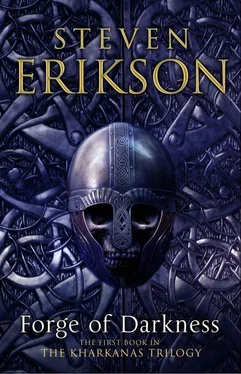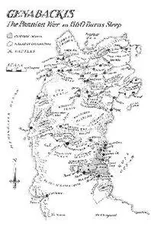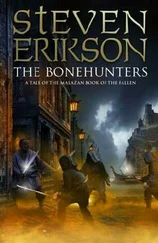Steven Erikson - Forge of Darkness
Здесь есть возможность читать онлайн «Steven Erikson - Forge of Darkness» весь текст электронной книги совершенно бесплатно (целиком полную версию без сокращений). В некоторых случаях можно слушать аудио, скачать через торрент в формате fb2 и присутствует краткое содержание. Жанр: Фэнтези, на английском языке. Описание произведения, (предисловие) а так же отзывы посетителей доступны на портале библиотеки ЛибКат.
- Название:Forge of Darkness
- Автор:
- Жанр:
- Год:неизвестен
- ISBN:нет данных
- Рейтинг книги:3 / 5. Голосов: 1
-
Избранное:Добавить в избранное
- Отзывы:
-
Ваша оценка:
- 60
- 1
- 2
- 3
- 4
- 5
Forge of Darkness: краткое содержание, описание и аннотация
Предлагаем к чтению аннотацию, описание, краткое содержание или предисловие (зависит от того, что написал сам автор книги «Forge of Darkness»). Если вы не нашли необходимую информацию о книге — напишите в комментариях, мы постараемся отыскать её.
Forge of Darkness — читать онлайн бесплатно полную книгу (весь текст) целиком
Ниже представлен текст книги, разбитый по страницам. Система сохранения места последней прочитанной страницы, позволяет с удобством читать онлайн бесплатно книгу «Forge of Darkness», без необходимости каждый раз заново искать на чём Вы остановились. Поставьте закладку, и сможете в любой момент перейти на страницу, на которой закончили чтение.
Интервал:
Закладка:
There had been no images of these creatures anywhere among the keep’s tapestries, statuary and friezes, yet what else could they be? Arriving from the east, from the Jhelarkan Range, and no grass-eating beasts of old — she could see black leather harnesses on their long, lean forms; she could see the glint of iron blades strapped on to their forelimbs, and serrated discs flashing from their humped shoulders. They padded forward like swollen dogs, with hides of black or mottled tan, their long-snouted faces only hinted at beneath their boiled leather headgear — like hounds of the hunt, but they were their own masters.
It was said that this northern strain was kin to the Jheck of the far south, though purportedly much larger. Korya was relieved by that thought, since these Jheleck were nearly as big as warhorses. Though resembling dogs, they were said to be intelligent, possessors of a sorcery she knew only as Soletaken, though for her that was nothing more than a word, as meaningless as so many other words Haut had uttered over the years of her captivity.
She knew her master was not unaware of this intrusion. Nothing came on to his land without his knowing it, no matter how light the footfall or how thin the rush of air. Besides, he had sent her up here a short time past, his command harsh and snapping — she had at first imagined some transgression on her part, a chore not completed, a book left open, but she knew enough not to question him. In words he could wound deeply, and if he possessed humour she’d yet to find it. Yet still she was shocked when she heard the keep’s massive iron gate thunder open, and when she saw Haut emerge, no longer wearing his ratty, moth-eaten woollen robe, but bedecked instead in ankle-length black chain, overlapping iron scales shielding his shins and booted feet, with more of the same stacked along the breadth of his shoulders. From the flared back rim of his helmet of blackened iron, chain hung down like braided hair. When he paused and twisted round, glancing up towards Korya, she saw more chain, webbing his face beneath the eye-holes, dangling in tatters around his massive, stained tusks.
A sword was belted at his hip, but he made no move towards its long, leather-wrapped grip, his gauntleted hands remaining down at his sides as he swung back to face the Jheleck.
Haut was a scholar. He complained endlessly of brittle bones and arthritic pangs; she believed he was ancient, though she had no proof of that. His contempt for warriors was matched only by his disgust for war and all its idiotic causes. She had never before seen the armour he was now clad in, nor the weapon he now bore. It did not seem possible he was able to move under the weight of his accoutrements, yet he did so with grace, an ease she had never before seen in him.
It was as if the Aerie shifted beneath her, the world slipping in its massive gears. Mouth dry, she watched as her master marched directly towards the Jheleck, who now positioned themselves in a ragged row facing the Jaghut.
Halting ten paces away, and then… nothing.
Surely the Jhelarkan could not form words, not from bestial throats such as they must have possessed. If they spoke, it was through other means, yet there was no doubt in her mind that a conversation was now under way. And then Haut reached up and drew off his helmet, his long black iron-streaked hair falling loose in greasy ropes, and she saw him tilt his head back, and she heard him laugh.
Deep, rolling, a sound that did not fit into Korya’s world, a sound so unexpected it could stagger a goddess high upon her perch. Like thunder from the earth itself, that laughter rattled through her, climbed skyward like the beating of wings.
The Jheleck seemed to blur then, as if engulfed in black smoke, and moments later a score of warriors now stood in place of the beasts; and they began removing their long-snouted headgear, unstrapping the blades from their wrists and sliding the lengths down through iron loops in their harnesses; the serrated discs now jutted behind their heads like cowls.
What she could see of their faces was little more than the dark smudge of black beards and filthy skin. Apart from the now-loose leather armour, they appeared to be dressed in furs and hides. When they came forward, they shambled, as if unsteady on two legs.
Haut whirled round, looked up at her, and bellowed, ‘Guests!’
A solitary Jaghut and a young Tiste hostage: in this household there were no servants, no cooks, no butchers, no handmaids or footmen. The keep’s vast storerooms were virtually empty, and though Haut was quite capable of conjuring food and drink through sorcery, he rarely did so, relying almost exclusively on regular visits by the Azathanai traders who plied on seasonal rounds the tracks linking all the still-occupied keeps.
In the absence of staff, Korya had learned to bake bread; she had learned to make stews and broths; she had learned to chop wood and mend her own threadbare clothes. Haut had proclaimed these tasks to be essential elements of her education, but she had begun to believe such chores were the product of less sanguine factors, beginning and ending with Haut’s own indolence, and his general dislike of company. It was, she often reflected, a wonder that he had ever accepted her presence, and the responsibility of taking her in.
As a people, the Jaghut rarely had anything to say to each other; they seemed perversely divisive and indifferent to such concepts as society or community. But this rejection was a conscious one; they had once dwelt in a city, after all. They had once built an edifice to civilization unequalled anywhere in all the realms, only to then conclude that it was all some kind of mistake, a misapprehension of purpose, or, as Haut described it, a belated recognition of economic suicide. The world was not infinite, and yet a population could aspire to become so; it could (and would) expand well beyond its own limits of sustainability, and would continue to do so until it collapsed. There was, he said, nothing so deadly as success.
Wisdom did not belong to mortals, and those whom others called wise were only those who, through grim experience, had touched the very edges of unwelcome truths. For the wise, even joy was tinged with sorrow. No, the world made its demands upon mortals and they were immediate ones, pressingly, ferociously so, and even knowing a reasonable course was not enough to alter a mad plunge into disaster.
Words were no gift, said Haut. They were tangled nets snaring all who ventured into their midst, until an entire people could hang helpless, choking on their own arguments, even as dissolution closed in on all sides.
The Jaghut had rejected that path. Defying the eternal plea for communication among peoples, in the name of understanding, peace or whatever, they had stopped talking, even with each other. And their city was abandoned, home now to a single soul, the Lord of Hate, the one who had laid bare the brutal truth of the future awaiting them all.
This was the history Korya had learned, but that had been another age, when she was a child, and it was the child who made answer to the bewildering tale told her by Haut, with her dolls, a family, perhaps even a society, and in that society there were no wars, and no arguments and no feuds. Everyone smiled. Everyone looked on in surprise and wonder at the perfect world their goddess had created for them, and the sun was always bright and always warm. There was, she knew, no end to the dreams of children.
The Jheleck had brought food: meat still dripping blood, jugs of thick, dark wine, leather bags holding sharp stones of crystallized sugar. At Haut’s command she brought forth salty bread from the stone cupboard forming the back wall of the kitchen, and dried fruit from the cellar; and the fire was lit in the main hall and the high-backed chairs drawn in from the walls, their legs making furrows in the dust closing in on the long table from all sides. Tapers were dipped and awakened to smoky flame, and as the twenty-one Jheleck crowded in, flinging off pungent furs, barking in their sharp tongue, the vast room grew steamy and redolent with old sweat and worse. Rushing back and forth from back rooms and storage cupboards, Korya almost gagged again and again upon plunging into the fug; and only when at last she could sit down, upon Haut’s left, drinking deep from the flagon of bitter wine pushed her way, was she able to settle into this new, heady world.
Читать дальшеИнтервал:
Закладка:
Похожие книги на «Forge of Darkness»
Представляем Вашему вниманию похожие книги на «Forge of Darkness» списком для выбора. Мы отобрали схожую по названию и смыслу литературу в надежде предоставить читателям больше вариантов отыскать новые, интересные, ещё непрочитанные произведения.
Обсуждение, отзывы о книге «Forge of Darkness» и просто собственные мнения читателей. Оставьте ваши комментарии, напишите, что Вы думаете о произведении, его смысле или главных героях. Укажите что конкретно понравилось, а что нет, и почему Вы так считаете.












